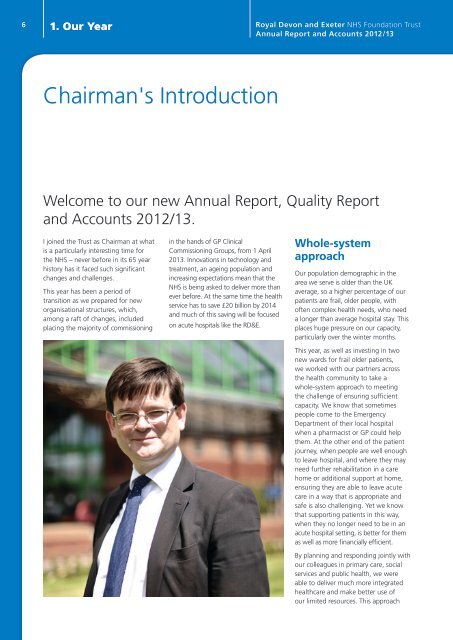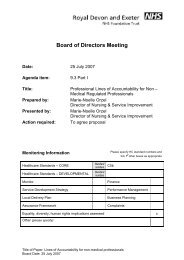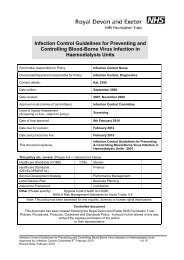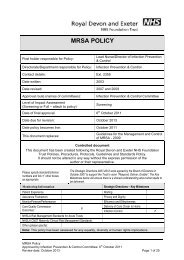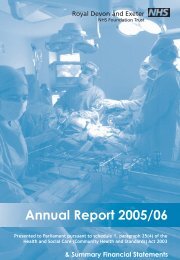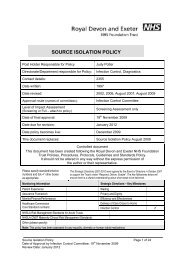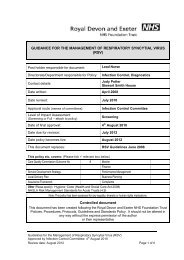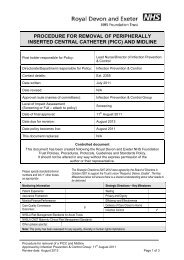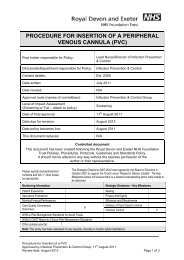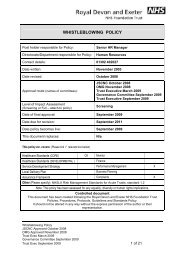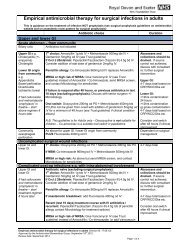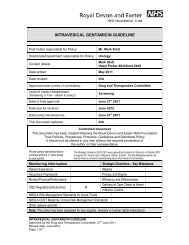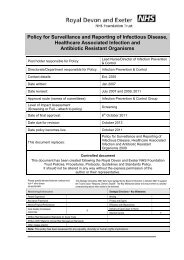Annual Report and Accounts 2012/13 - Royal Devon & Exeter Hospital
Annual Report and Accounts 2012/13 - Royal Devon & Exeter Hospital
Annual Report and Accounts 2012/13 - Royal Devon & Exeter Hospital
Create successful ePaper yourself
Turn your PDF publications into a flip-book with our unique Google optimized e-Paper software.
6 1. Our Year<br />
<strong>Royal</strong> <strong>Devon</strong> <strong>and</strong> <strong>Exeter</strong> NHS Foundation Trust<br />
<strong>Annual</strong> <strong>Report</strong> <strong>and</strong> <strong>Accounts</strong> <strong>2012</strong>/<strong>13</strong><br />
Chairman's Introduction<br />
Welcome to our new <strong>Annual</strong> <strong>Report</strong>, Quality <strong>Report</strong><br />
<strong>and</strong> <strong>Accounts</strong> <strong>2012</strong>/<strong>13</strong>.<br />
I joined the Trust as Chairman at what<br />
is a particularly interesting time for<br />
the NHS – never before in its 65 year<br />
history has it faced such significant<br />
changes <strong>and</strong> challenges.<br />
This year has been a period of<br />
transition as we prepared for new<br />
organisational structures, which,<br />
among a raft of changes, included<br />
placing the majority of commissioning<br />
in the h<strong>and</strong>s of GP Clinical<br />
Commissioning Groups, from 1 April<br />
20<strong>13</strong>. Innovations in technology <strong>and</strong><br />
treatment, an ageing population <strong>and</strong><br />
increasing expectations mean that the<br />
NHS is being asked to deliver more than<br />
ever before. At the same time the health<br />
service has to save £20 billion by 2014<br />
<strong>and</strong> much of this saving will be focused<br />
on acute hospitals like the RD&E.<br />
Whole-system<br />
approach<br />
Our population demographic in the<br />
area we serve is older than the UK<br />
average, so a higher percentage of our<br />
patients are frail, older people, with<br />
often complex health needs, who need<br />
a longer than average hospital stay. This<br />
places huge pressure on our capacity,<br />
particularly over the winter months.<br />
This year, as well as investing in two<br />
new wards for frail older patients,<br />
we worked with our partners across<br />
the health community to take a<br />
whole-system approach to meeting<br />
the challenge of ensuring sufficient<br />
capacity. We know that sometimes<br />
people come to the Emergency<br />
Department of their local hospital<br />
when a pharmacist or GP could help<br />
them. At the other end of the patient<br />
journey, when people are well enough<br />
to leave hospital, <strong>and</strong> where they may<br />
need further rehabilitation in a care<br />
home or additional support at home,<br />
ensuring they are able to leave acute<br />
care in a way that is appropriate <strong>and</strong><br />
safe is also challenging. Yet we know<br />
that supporting patients in this way,<br />
when they no longer need to be in an<br />
acute hospital setting, is better for them<br />
as well as more financially efficient.<br />
By planning <strong>and</strong> responding jointly with<br />
our colleagues in primary care, social<br />
services <strong>and</strong> public health, we were<br />
able to deliver much more integrated<br />
healthcare <strong>and</strong> make better use of<br />
our limited resources. This approach


